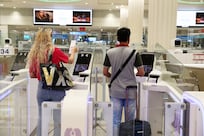Russian President Vladimir Putin was sworn in for a fifth term on Tuesday, offering closer ties with “the world's majority” after the West largely boycotted his inauguration.
Mr Putin, 71, took the oath of office at the Kremlin after winning an election that no serious challenger was allowed to enter.
His new six-year term is set to prolong the Putin era until at least 2030 after he had Russia's constitution changed to bypass term limits.
Since ordering the invasion of Ukraine in 2022, he has defied sanctions and international pressure by tightening his grip on power and presiding over a growing war economy.
On the eve of his inauguration, he ordered troops stationed near Ukraine to hold tactical nuclear weapons drills in a show of force to the West.
In a short speech on Tuesday, Mr Putin said dialogue with the West remains possible but “only on equal terms, respecting each other’s interests”.
He said Moscow is open to developing relations with other countries he described as “the world's majority”.
Vladimir Putin's inauguration ceremony – in pictures
Russia's government was dissolved as part of the formalities, giving Mr Putin the option of a Kremlin reshuffle.
Russians “have confirmed the correctness of the country’s course. This is of great importance right now, when we are facing serious challenges,” he told assembled officials and dignitaries.
“We are a united and great people and together we will overcome all obstacles, we will bring to life everything we have planned. Together we will be victorious.”
Many western countries avoided Tuesday's ceremony, after describing the election as a sham and condemning balloting in occupied Ukrainian territory. France sent an ambassador.
“We certainly did not consider that election free and fair,” said US State Department spokesman Matthew Miller.
He accused Russia of “reckless and irresponsible” rhetoric on nuclear weapons but said there was no indication it planned to use them in Ukraine.
In Germany, which also boycotted the inauguration, Chancellor Olaf Scholz said it was “important to make clear that nuclear weapons must not be used in this war”.

Moscow said the nuclear drills were a response to hints by French President Emmanuel Macron and others that the West could deploy ground troops to Ukraine.
The Kremlin's troops have gone back on the offensive in recent months after a much-anticipated Ukrainian counterattack failed to knock out Russia's defences.
Mr Putin is wanted by the International Criminal Court over alleged Russian war crimes since he ordered the invasion of Ukraine in 2022.
Ukraine said Tuesday's ceremony gave an “illusion of legality” to the “nearly lifelong stay in power of a person who has turned the Russian Federation into an aggressor state”.
Mr Putin, a former Soviet intelligence agent, succeeded former president Boris Yeltsin on the last day of 1999.

After hitting a limit of two consecutive terms he switched to the prime minister's office in 2008 before returning as president in 2012.
Since then he has had his term-limit slate wiped clean to allow for two more terms that could in theory keep him in power until 2036.
His best-known opponent, Alexey Navalny, died in an Arctic prison in February and other prominent critics are in jail or have fled abroad.














